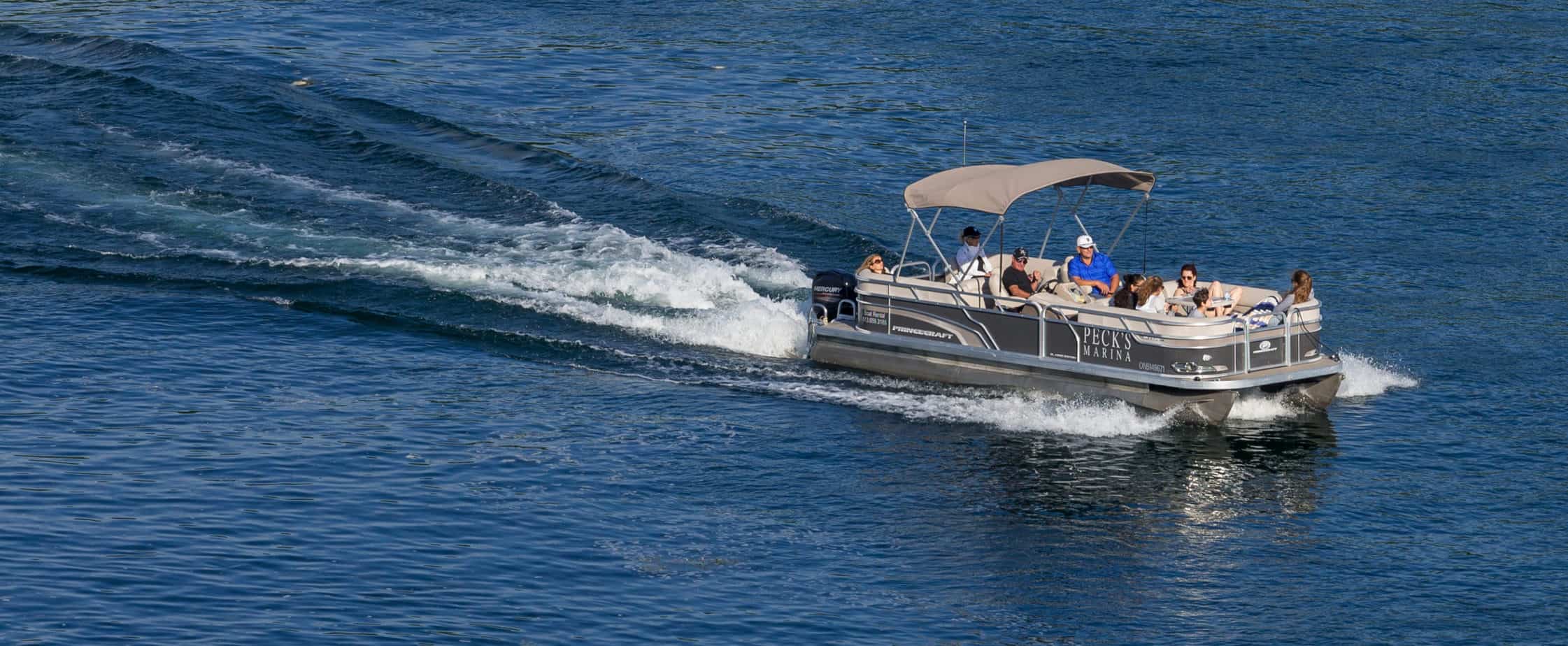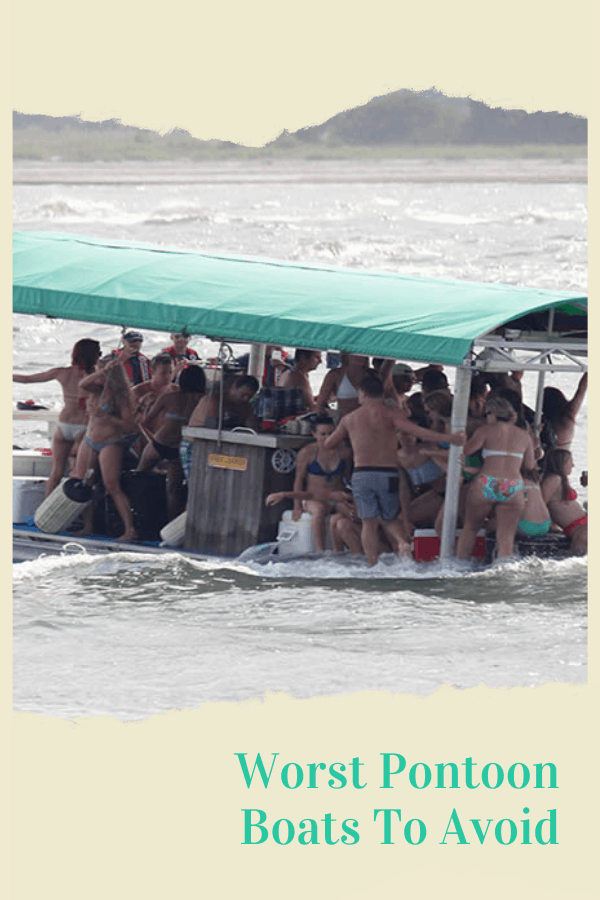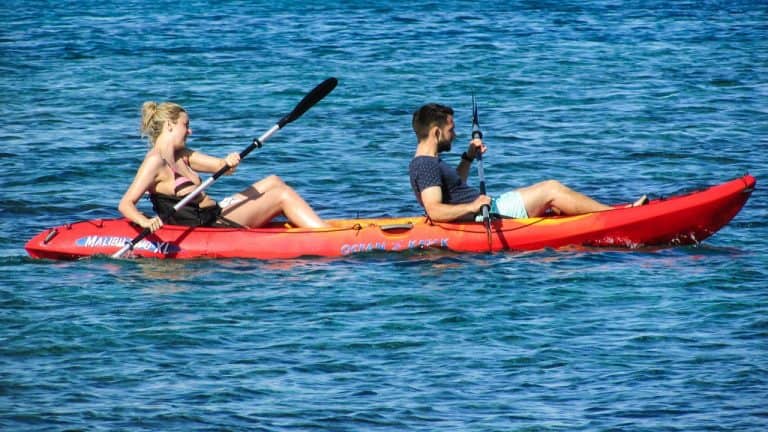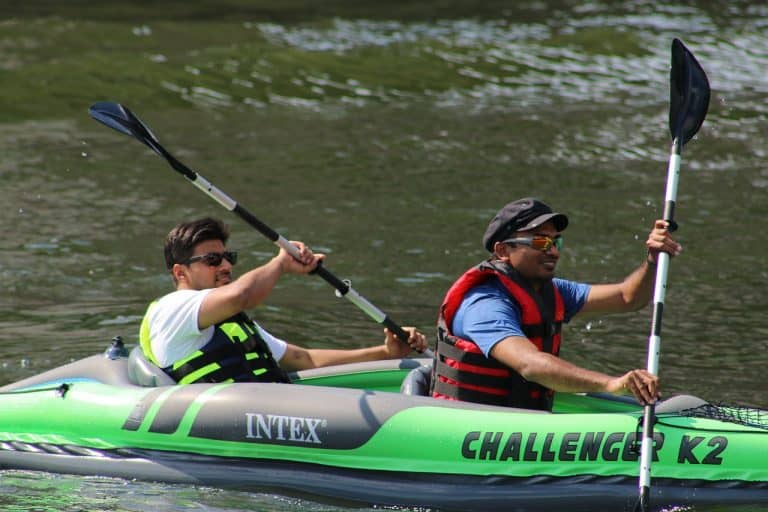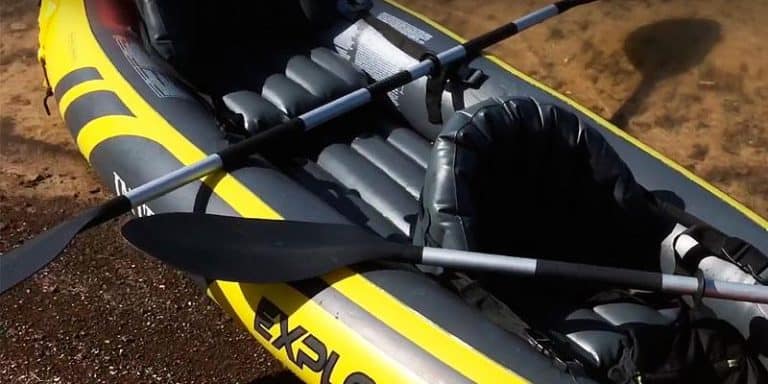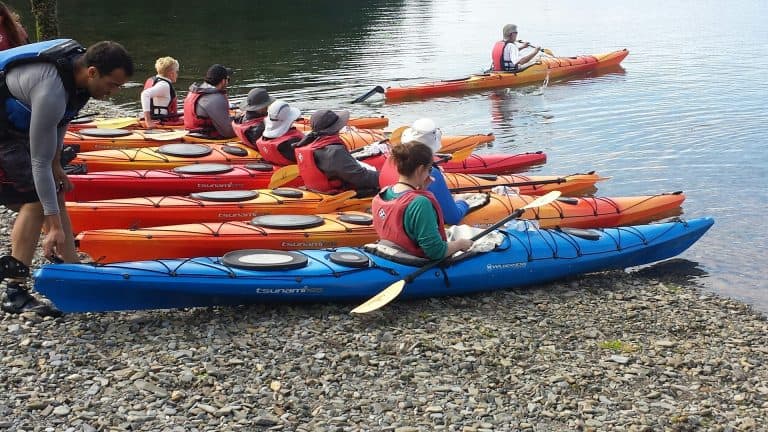If you want to keep something like the unfortunate scenario pictured above from happening, you’ll need to know about the worst pontoon boats to avoid.
Of course, we are huge believers in the benefits of human-powered watercraft, but we know that pontoon boats have their benefits as well.
Pontoon boats are great for social gatherings on calm lakes, slow-moving (wide) rivers, and sometimes even protected coastal waterways.
They have a larger carrying capacity than most personal watercraft and they also require minimal effort to get around.
That said, motorized watercraft always require more care and maintenance than one of the best kayaks or canoes. They are also much more expensive to buy and maintain.
In this article, we’re going to address whether there are any pontoon boats to avoid in your buying process.
We’ll also address some common problems that come with pontoon boats and provide some buying tips to help you find a boat you can trust.
So let’s get started.
The Worst Pontoon Boats To Avoid
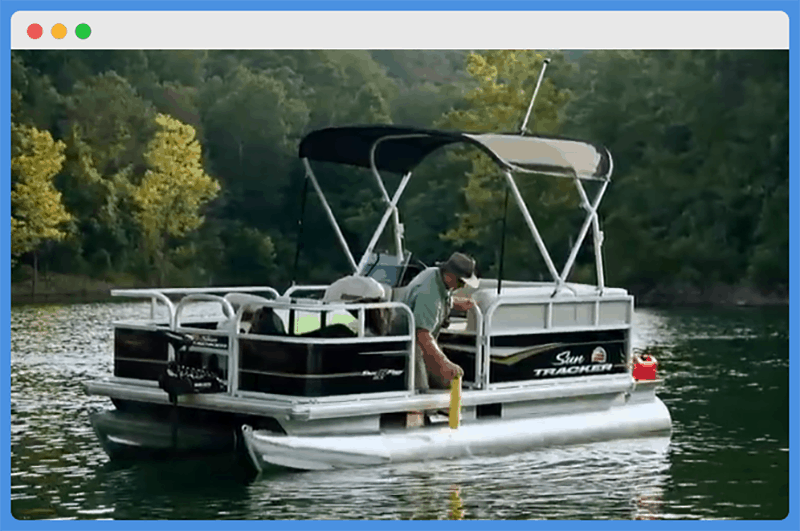
To be quite honest, we couldn’t find any pontoon boats that we wouldn’t trust out there.
If it was made anytime since 2000, the brands on the market these days are all quite trustworthy and well-respected, and there are plenty of user reviews to back that up.
That being said, buying a used boat is always a risky proposition if you don’t quite know what to look for.
That’s why we’re going to provide a helpful section for boat buyers to really narrow down their selections and make sure they aren’t getting a lemon.
It’s also important to point out that user error can certainly make any boat very dangerous (pontoon or otherwise).
There are also some important downsides to pontoon boats that you should consider before you buy one.
However, if you really want to avoid one of the worst pontoon boats out there, just make sure you don’t buy something that’s more than 20 years old.
From there, utilize the tips in our buying guide to thoroughly inspect any new or used pontoon boat before purchasing.
Also Read: Pontoon Boat vs Flat Hull
Common Pontoon Boat Problems
Although it’s good news that there aren’t particularly any pontoon boat brands out there that you should avoid at all costs, pontoon boats, in general, do experience some issues that other types of boats and watercraft do not.
Here are five of the most common problems that pontoon boat owners run into:
Common Engine Problems
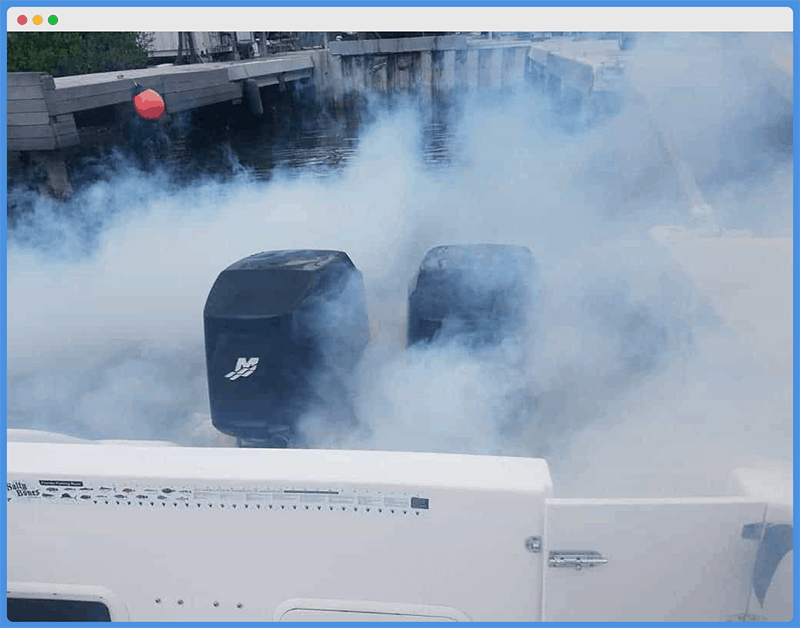
The four main engine problems that pontoon boaters experience can be summed up as overheating, lack of power, emission of smoke from the exhaust, and a ”˜no-start’.
This last issue is when the engine simply won’t start, and it could be the result of several issues.
Engine overheating typically occurs when the engine’s cooling system is blocked or not functioning properly.
It can also be the result of a drive belt breaking, which will also put your alternator and water pump out of commission.
The best course of action to avoid engine overheating is to keep your eye on the temperature gauge while you’re operating your boat.
Also, it’s a good idea to keep a spare drive belt on hand in case of an emergency.
When you’re experiencing a lack of power from your boat engine, there could be several issues.
A sputtering engine could simply mean that you’re out of gas, but it could also be a sign of issues with your fuel filter or spark plugs.
If you notice smoke emitting from the engine exhaust on your pontoon boat, it’s going to be alarming.
The good news, however, is that it doesn’t always signal a major engine problem.
A smoking exhaust, in fact, is usually indicative of a fuel injection issue, the presence of contaminated fuel, or too much (or too little) engine oil in the system.
Finally, the first, and most obvious cause of a no-start is the lack of sufficient charge in your boat’s battery.
If a battery test reveals you have a good battery, it could also be the function of a blown fuse, tripped breaker, or loose connections somewhere in your boat’s electrical system.
Also Read: Magical Movie Night Ideas On A Pontoon
Excessive Vibrations
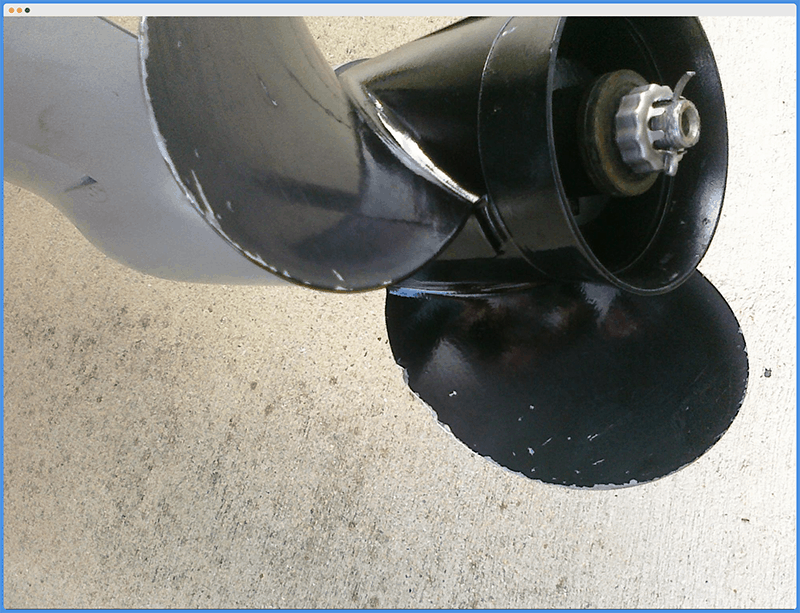
Some pontoon boats will start to vibrate or shake noticeably over time.
This is usually a sign that something is wrong with your propeller.
If you notice that the vibration worsens as you accelerate, the odds are pretty good that your propeller is damaged.
Some of the common causes of propeller damage include direct impacts that cause the propeller to become misshapen, line or rope wrapping around the propeller shaft, or even small hits that leave nicks or chips in the propeller blades.
Check Out: Pontoon Boats Upkeep
Whether it’s the result of hitting a submerged object, a manufacturing issue, or something else entirely, a bad propeller will cause your boat to shake annoyingly (and sometimes dangerously).
If you are always diligent about raising the motor when you’re entering shallow water, you can significantly decrease the risk of impacts to your boat’s propeller.
If you do suspect that your propeller is damaged, the best course of action is to limp back to the marina at a slow, safe cruising speed.
The problem with damage to the blades or shaft of a pontoon boat’s propeller is that it can’t be easily diagnosed or fixed while you’re on the water.
So you’ll have to make it back to a safe landing before you can really dive into the heart of the problem.
Also Read: Pontoon Boat Hacks For Beginners
Shifting Issues
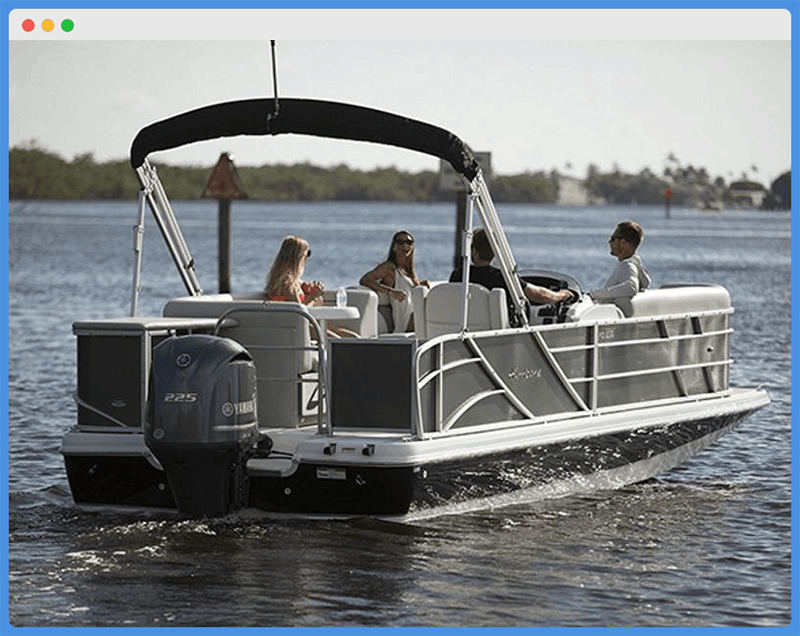
Many past pontoon boaters have experienced the unfortunate scenario of not being able to get their boat out of idling speed.
This is usually the result of your boat’s shifter failing to adequately engage the transmission.
The majority of ponton boats out there are equipped with mechanical cable gear shifters that sometimes experienced failed or broken linkages.
In the base case scenario, the linkage can simply become detached from the gearbox and will require a simple reattachment to fix.
If you don’t find a broken, stuck, or detached linkage, there is a real chance that you could be dealing with a transmission failure.
The most common cause of transmission failure is a lack of fluid, so you should be sure to have backup transmission fluid on hand in case you need to top it off.
Explore: Best Luxury Pontoon Boats
Steering Issues
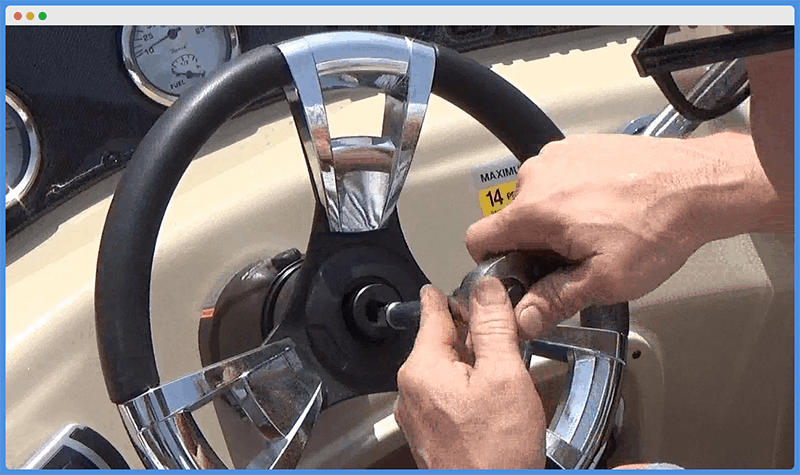
Most modern pontoon boats are equipped with a power steering system that’s similar to what you find on modern vehicles.
Unlike older boats (and vehicles) that didn’t offer power steering, modern models rely on hydraulic fluid.
When the fluid level gets too low, it becomes much more difficult to steer your boat, which could create all sorts of issues.
So if you’re having trouble steering, the first thing you should do is check the level of your vessel’s hydraulic fluid.
If it’s low, you should start by adding fluid and then checking to make sure there’s not a leak anywhere around the steering arm or engine compartment.
If your steering arm won’t turn at all, you could be facing a larger mechanical failure.
Also Read: Most Expensive Pontoon Boats
Pontoon Damage/Lack of Flotation
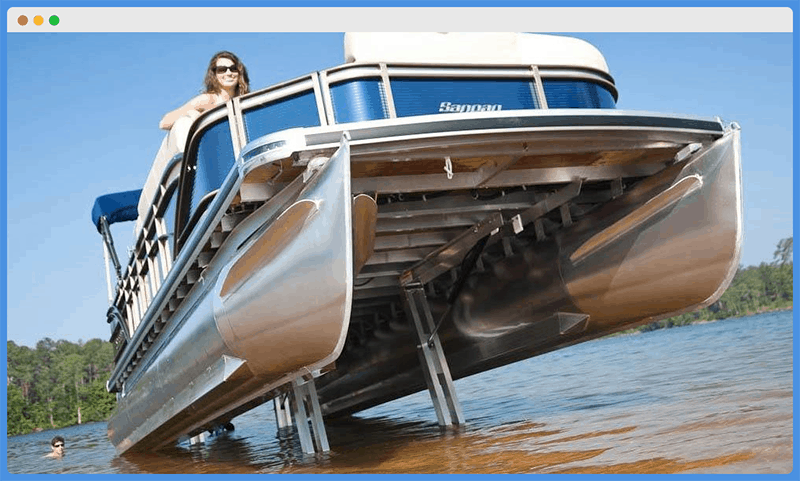
The last common problem that pontoon boats experience is damage to the actual pontoons that provide a lot of the flotation for the boat.
As you might imagine, this is a worst-case scenario for any boat, and it’s not easily remedied on the water (or off of it for that matter).
The main cause of damage to the pontoons on one of these boats is a hard impact in shallow water.
Most of these pontoons are manufactured using aluminum, so they aren’t particularly susceptible to wear over time.
That being said, pontoon boats rely on the air inside their pontoons for most of their flotation.
So when one (or both) of these pontoons is compromised, it obviously creates major issues for the safety of your boat and all of the passengers on board.
Pontoon Boat Buying Guide
Now that you know about some of the common problems that come along with pontoon boats, it’s time to learn how to make the best selection possible.
The tips in this buying guide will help to guide your selection process whether you’re buying a new or used pontoon boat.
Seating Capacity
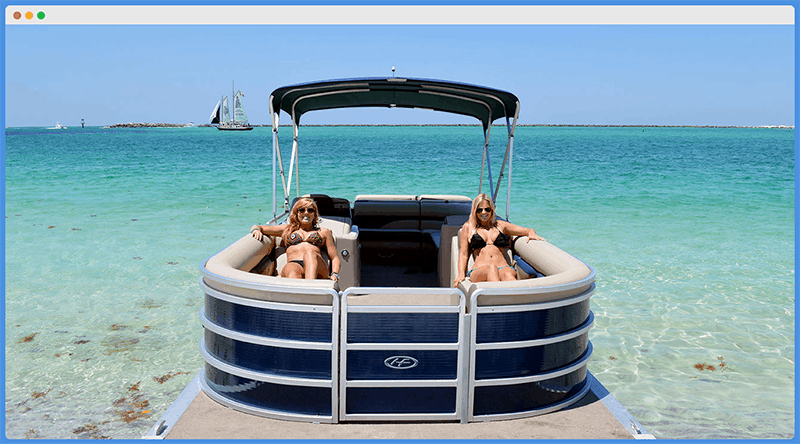
The first thing you should consider before buying a pontoon boat is how many people you intend to have on board during a typical outing.
You should never exceed the recommended number of passengers or weight limit for any watercraft, and pontoon boats are no exception.
The good news is that pontoon boats are built to handle a higher number of passengers than most ski/wakeboard or fishing boats.
Still, you’ll need to decide whether your boat is going to be used for small family outings or larger social gatherings.
Boat Length
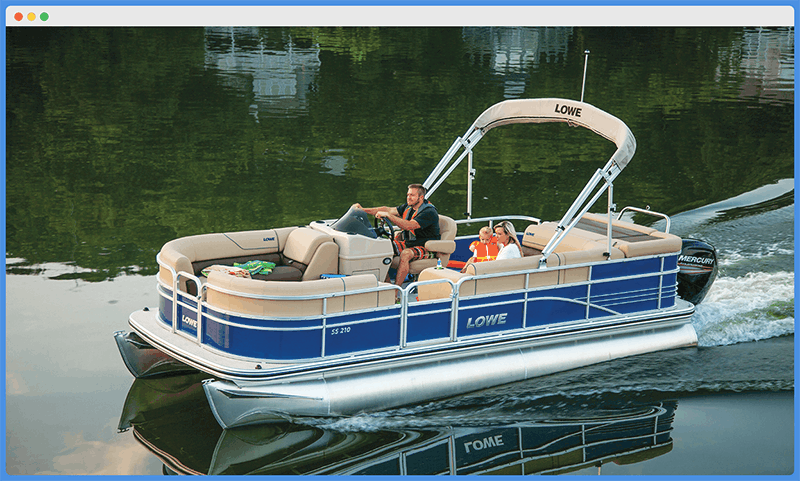
In some ways, the number of people you want to fit on your pontoon boat will dictate how large of a boat you need.
If you plan to keep things at a maximum of five passengers, for example, you’ll probably be fine with a boat that’s 15 feet long or less.
To accommodate anywhere from six up to 10 passengers, we’d recommend a pontoon boat between 16 and 21 feet in length.
For larger gatherings of 10 to 16 passengers, you will need a boat from 21 to 28 feet in length.
Keep in mind that a longer boat requires a longer and larger trailer that will be able to safely transport its higher weight.
That will also require a larger truck or vehicle that is capable of towing that trailer-boat combination.
It will also mean that navigating your pontoon boat will be a bit trickier and you may need to purchase a larger slip at your local marina for storing your boat when it’s not in use.
All of these are added logistical considerations and expenses that should be considered before buying a new boat.
Preferred Activities
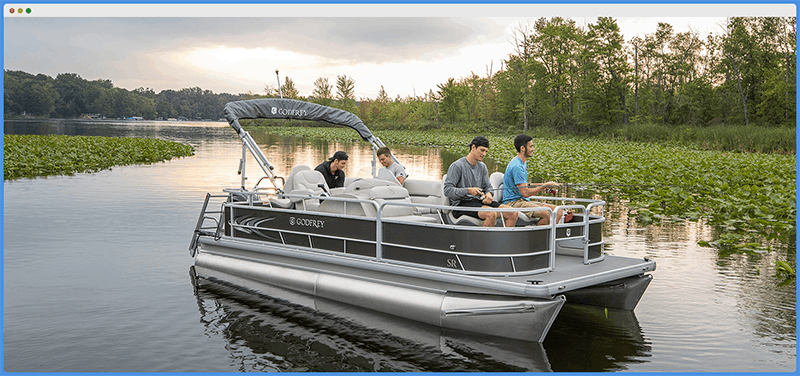
Next, consider how you’ll use your pontoon boat on a typical day.
Is your family heading out to simply relax, swim, play a game or two, and just generally enjoy each other’s company?
Are you and your children really interested in expanding your fishing range? Do you often host gatherings that you feel would be way better if they were hosted on the water?
Your answer to these questions (among others) will play a major role in finding the right floor plan for your pontoon boat.
As you might imagine, those that need a boat for fishing will need a more open floor plan that makes it easier to move about the boat as fishing requires.
If your family loves water skiing or tubing behind your boat, you’ll need a model with more horsepower so that you can pull skiers up out of the water.
For those interested in hosting gatherings on their pontoon boat, the seating layout will probably be one of the top priorities.
How Much Do You Care About Speed?
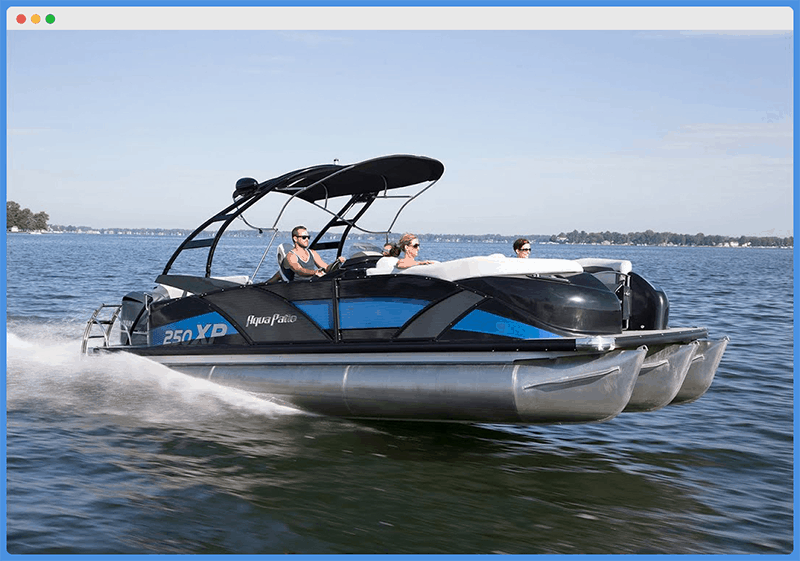
If you plan on packing your pontoon boat with guests, the odds are pretty good that you’ll be keeping things at a relatively modest cruising speed while you’re underway.
In fact, as the number of passengers on your boat goes up, we highly recommend reducing your maximum speed over the water.
If you are buying your pontoon boat for family use and you want something that can zip around from cove to cove on your local reservoir, you’ll want something with a little more horsepower.
For those that plan on being able to run their pontoon boat at higher speeds for tubing, skiing, or just getting around quickly, we’d recommend looking for something with at least 300 horsepower.
If you know you won’t be towing people behind your boat but you still want to be able to get around relatively quickly, shoot for something in the 150 to 300 horsepower range.
On the low end, those that know they are only going to be cruising around at slower speeds in their pontoon boat will be fine with something in the 40 to 60 horsepower range.
Location
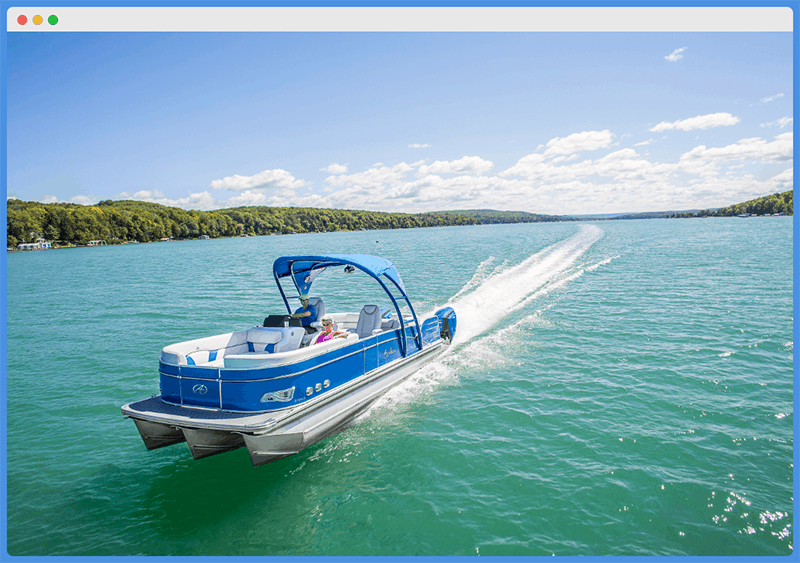
Your location will also have some impact on the size of the pontoon boat that makes the most sense for you.
It will also have a larger impact on how you use, store, and maintain your boat over its lifetime.
If you live in a colder climate where things are likely to freeze for anywhere from two to six months out of the year, you’ll need to know how to winterize (and subsequently de-winterize) your boat.
It will also come in handy if there are plenty of enclosed, heated storage locations in your area with bays large enough to accommodate the boat you’re interested in.
For those that know they’re going to be taking their pontoon boat on larger lakes or coastal waterways that sometimes experience rough waters, it pays to look into a larger model that can handle bigger waves and plenty of chop caused by weather or other boaters.
Additionally, you should consider whether there’s a nearby marina where you can purchase a slip and keep your boat stored in the water during the boating season.
If this isn’t the case, you’ll need to have a truck and trailer that can tow the boat safely to and from your home to the water.
You’ll also need to have plenty of space to navigate your boat into your driveway and store it somewhere on your property.
Finally, those that know they are going to be using their pontoon boat in saltwater should get familiar with the impacts of salt on a boat and all of its components.
Fortunately, the aluminum that most pontoon boats are made with isn’t particularly susceptible to corrosion, but some of the other internal components of your boat could rust or corrode quickly if not properly cared for.
Additional Features
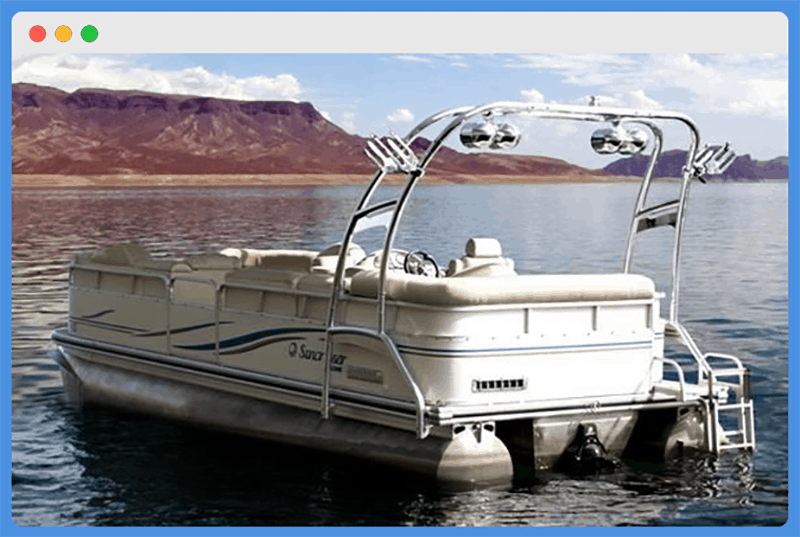
There are a number of special packages and add-ons that you can choose when you’re buying a pontoon boat.
Most of them will be specific to the kinds of activities you’ll primarily be partaking in when your boat is underway.
Some examples of these additional features include a wakeboard tower, ski tow bar, GPS, fishfinder, fishing rod holders, live well, diving board, water slide, changing station, satellite radio, speakers, an upper deck, wine rack, and much more.
For those that are seeking a higher-performing boat, there are also a number of performance packages and upgrades that buyers can choose from.
That includes engine upgrades rough water packages, windshield re-sizing, captain’s chair upgrades, and more.
Ultimately, the upgrades you choose will add to the total cost of your pontoon boat.
They will also be an important step to customizing the boat of your dreams so that it accommodates your each and every need while you’re on the water.
Budget
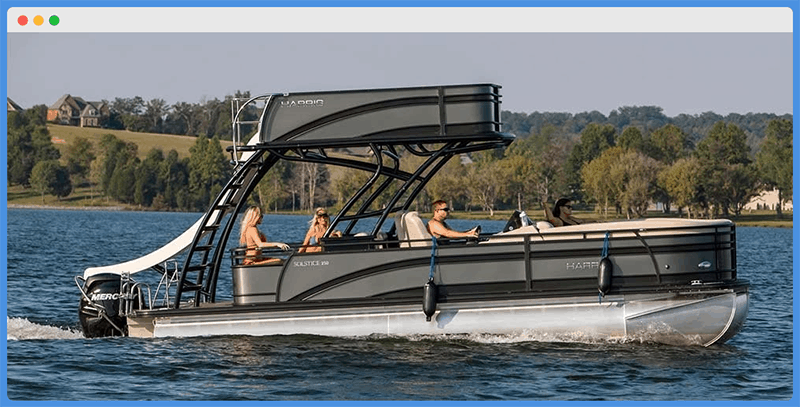
The last thing to consider is how much you want to spend on your new pontoon boat.
There’s an old saying amongst boat owners that the term boat is just shorthand for ”˜borrow another thousand’.
This is the result of the fact that the costs of maintenance, repairs, and general upkeep on any boat can add up quickly.
These costs are exponentially higher than if you were to buy, say, one of the best sea kayaks instead.
Many boat manufacturers and dealerships do offer financing that can help you spread the cost of your new boat over a longer period of time.
You’ll also need to consider, however, buying insurance on your new boat, getting it properly registered, and acquiring all of the additional safety equipment and accessories that all responsible boaters should have on board.
At the end of the day, only you know how much you’re willing to spend on your new boat.
It’s safe to say, however, that you’ll need to budget another two or three thousand above the list price of your boat to really start using a boat safely and responsibly.
Final Thoughts
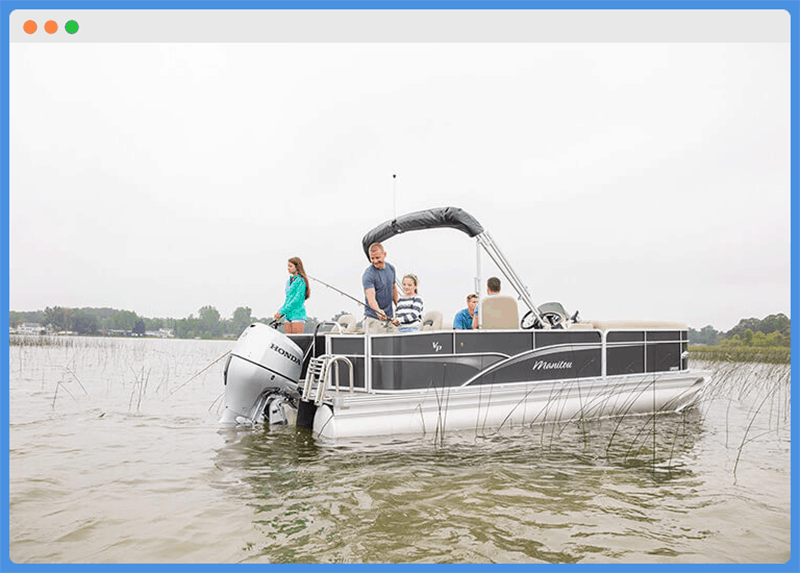
Pontoon boats certainly don’t sound like a bad idea in theory.
In our opinion, however, there are countless ways in which you could allocate your recreational funds more efficiently and effectively.
We know that getting out on the water in a pontoon boat sounds much easier than paddling a kayak or canoe.
That’s only a surface-level reaction that doesn’t account for all the work (and extra money) required to transport, maintain and care for a pontoon boat.
On the flip side, smaller, non-motorized personal watercraft are much lighter and they require much less space to store when you’re not on the water.
You also won’t need an expensive trailer to haul a kayak or canoe with you wherever you go.
Finally, we think that the exercise you get with a personal kayak or one of the best tandem kayaks will leave you feeling happier and healthier at the end of the day.
So while we appreciate that there’s a time and place for a pontoon boat, we believe wholeheartedly in the benefits of human-powered recreation!
Also, if you are deadset on buying a new pontoon boat, we’d recommend looking for something from Bennington, Tahoe, Ranger, Sylvan, or SunChaser, just to name a few!

